Two popular groups of online Duke non-credit courses are being made available – free – for students affected by the ongoing Russian invasion of Ukraine.
Four computer programming courses hosted by the online learning platform Coursera are being licensed to a Ukrainian non-governmental organization, which will translate the materials and host them for use by Ukrainians.
In addition, four courses in logic and critical thinking – taught jointly by Walter Sinnott-Armstrong, a Duke philosophy professor, and Ram Neta, a UNC-Chapel Hill philosophy professor, are being translated into both Kazakh and Russian, for use by students in Kazakhstan. (About 40 percent of Kazakh citizens speak Russian.)
The coding specialization is particularly popular; in one six-month span last year, about 30,000 people were enrolled in its first course.
“We are very proud of the course we created and privileged to join efforts from other universities in support of the Ukrainian people,” said Owen Astrachan, a Duke computer science professor who teaches the coding courses with three colleagues. “It's a small contribution we are making, but we are so grateful that we can make it, and that Duke has supported us in making it.”
Duke is not alone in these efforts. In both cases, other universities provide online learning materials as well. For example, a Ukrainian non-governmental organization called Prometheus has also worked with Harvard University, University of Queensland in Australia and others to license digital course materials.
“This is really about access to education and shows the way in which digital education makes it so easy for us to expand access,” said Quentin Ruiz-Esparza, associate director for the Online Duke team in Learning Innovation.
The licensing of the computer programming specialty is the result of a partnership between Duke, Prometheus and the US Embassy in Ukraine. The free licensing of these courses will be a key component of humanitarian assistance the US government is proving to support the Ukrainian people, according to correspondence between the three partners.
Coursera was an early entrant into the Massive Open Online Course revolution, providing a broad platform for universities to contribute high-quality digital courses to reach new populations across the globe. Duke has partnered with Coursera for more than a decade and at any time has at least 40,000 people active in its courses on that platform, Ruiz-Esparza said. Courses are free, but students can pay a fee to receive a formal certificate upon completion.
“Coursera really provides Duke with a way to broaden access to education,” he said. “If a Duke school or academic unit has an idea for a self-paced course they’d like to launch, that showcases a faculty member’s expertise or meets an educational need in society, Coursera provides an option in a fairly low-cost and potentially high-impact way.”
